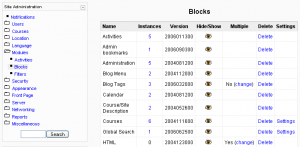Managing blocks: Difference between revisions
(→Block for administrators: Edit list of administration blocks & format) |
(→Block for administrators: rename subheading) |
||
| Line 32: | Line 32: | ||
*[[Remote RSS Feeds block configuration]] | *[[Remote RSS Feeds block configuration]] | ||
== | ==Blocks (administrator) list== | ||
There are special block only available to administrators. Some depend upon context (for example a Site's front page or a Course's main page) or may only appear once in a specific context (for example the site administration block). A few [[Blocks (teacher)|teacher blocks]] are available to administrators on a pull down menu. | There are special block only available to administrators. Some depend upon context (for example a Site's front page or a Course's main page) or may only appear once in a specific context (for example the site administration block). A few [[Blocks (teacher)|teacher blocks]] are available to administrators on a pull down menu. | ||
Revision as of 11:22, 24 October 2007
Location: Administration > Modules > Blocks
The blocks administration page enables administrators to manage installed blocks and their settings.
Hiding a block
The hide/show column allows selected blocks to be hidden i.e. they do not appear in any course "Add a block" dropdown menu and cannot be used in any course. To hide a block, click the eye icon so that it changes to a closed eye.
To reduce the length of course "Add a block" dropdown menus, you should hide blocks which will not be used, such as global search (unless you have enabled the global search feature in Administration > Miscellaneous > Experimental), mentees (unless you have added a mentor role) and network servers (unless you are using Moodle Networking).
Instances
The blocks page also lists the number of instance for each block. Clicking on a number results in the list of courses containing that block being displayed.
Multiple blocks
Some blocks, such as the HTML block, can be used more than once on a course page. You can choose whether or not to allow this by clicking the change link in the Multiple column.
Block deletion
Any block can be deleted using the link in the delete column. There is no reason for standard blocks to be deleted, however non-standard blocks may need to be deleted before upgrading.
Note: To delete a block completely, in addition to deleting it on the blocks page, you also need to remove/delete the actual block folder from the moodle/blocks folder, otherwise Moodle will reinstall it next time you access the site administration.
Block settings
A few blocks have additional settings, which can be accessed via the links in the settings column.
Blocks (administrator) list
There are special block only available to administrators. Some depend upon context (for example a Site's front page or a Course's main page) or may only appear once in a specific context (for example the site administration block). A few teacher blocks are available to administrators on a pull down menu.
The list below has the administrator blocks shown in bold:
|
Non-standard blocks
In addition to using the blocks included in the standard download, you can download and install non-standard (also known as third-party) blocks from the Moodle.org Modules and plugins database.
Warning: Be aware that third-party blocks may have quality issues, may not work correctly, and may not work when you upgrade Moodle. You should test them thoroughly before using them and be prepared to uninstall them before upgrading.
See also
- Block layout
- non-standard blocks - a list of additional blocks available plus installation instructions
